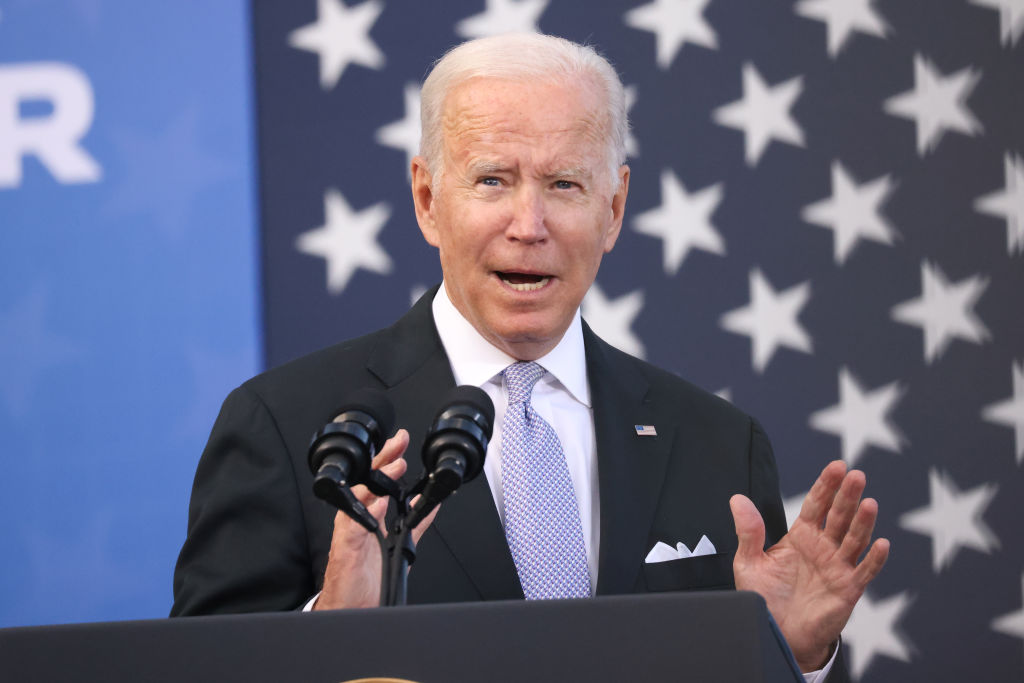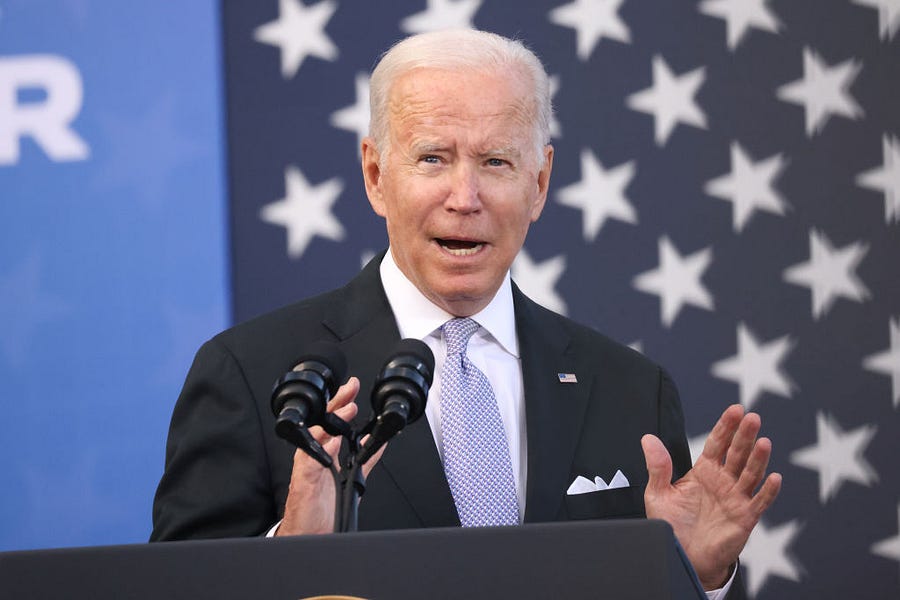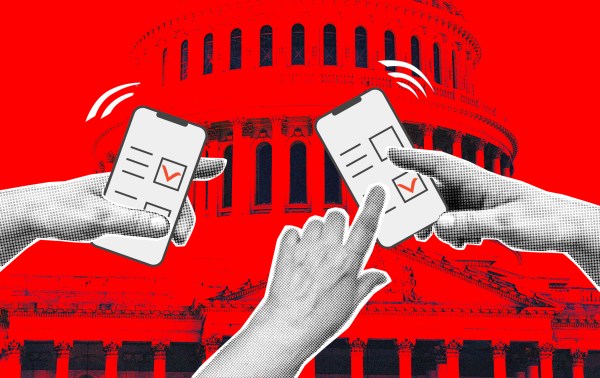Happy Monday! If you’re not watching Succession, you’re missing out.
Quick Hits: Today’s Top Stories
-
In a study published by the Food and Drug Administration (FDA) on Friday (and conducted while the Delta variant was surging), Pfizer and BioNTech said their reduced-dosage COVID-19 vaccine for children ages 5 to 11 is nearly 91 percent effective at preventing symptomatic infection. FDA staff concluded over the weekend that the benefits of the vaccine to children outweigh the risks, and an agency advisory group is set to meet this week to recommend formal authorization.
-
Central Command spokesperson Army Maj. John Rigsbee announced on Friday that the United States conducted an airstrike in northwest Syria that killed Abdul Hamid al-Matar, a senior leader of al-Qaeda. Rigsbee said there was “no indication” of civilian casualties, and that the strike “will disrupt the terrorist organization’s ability to further plot and carry out global attacks threatening U.S. citizens, our partners, and innocent civilians.”
-
The Ethiopian government confirmed on Friday that it launched an airstrike on Mekelle, the capital of the country’s northern Tigray region. The government claimed it was targeting a military facility used by the Tigray People’s Liberation Front (TPLF), but the TPLF and humanitarian sources told Reuters that the strike hit a university. The United Nations suspended flights carrying aid workers to the region as a result.
-
Neera Tanden—whose nomination for director of the Office and Management and Budget was withdrawn earlier this year—was on Friday named White House staff secretary.
Biden Tips the United States’ Hand on Taiwan. Or Does He?

As discussed on multiple Dispatch Podcasts last week, the Financial Times recently reported that China tested a nuclear-capable hypersonic missile in August, launching the projectile into space, where it circled the globe before hurtling back toward Earth and missing its intended target by just 24 miles.
It was in this context that CNN’s Anderson Cooper pressed President Joe Biden last Thursday on the United States’ relationship with Taiwan. “What will you do to keep up with [China] militarily?” he asked. “And can you vow to protect Taiwan?”
“Yes and yes,” Biden responded. “China, Russia, and the rest of the world knows we have the most powerful military in the history of the world. Don’t worry about whether [they’re] going to be more powerful. What you do have to worry about is whether or not they’re going to engage in activities that will put them in a position where they may make a serious mistake.”
What Biden meant by “serious mistake” soon became clear. “So, are you saying that the United States would come to Taiwan’s defense if China attacked?” Cooper asked. Biden responded in the affirmative: “Yes, we have a commitment to do that.”
It’s not the first time in his presidency Biden has drawn that particular line in the sand. “We made a sacred commitment to Article 5 that if in fact anyone were to invade or take action against our NATO allies, we would respond,” he told ABC News’ George Stephanopolous a few months ago. “Same with Japan, same with South Korea, same with Taiwan.”
But within hours of that interview airing back in August, a Biden administration official blasted a clarification out to reporters saying the United States’ “policy with regard to Taiwan has not changed.” The same thing happened last week.
“The U.S. defense relationship with Taiwan is guided by the Taiwan Relations Act,” a White House spokesperson told the Washington Post on Friday. “We will uphold our commitment under the Act, we will continue to support Taiwan’s self-defense, and we will continue to oppose any unilateral changes to the status quo.”
The “commitment” Biden alluded to on Thursday could technically refer to the United States’ continued role supplying arms to Taiwan, but most—including the Chinese leadership—interpreted the president’s comments to mean U.S. military involvement.
“The Taiwan question is purely China’s internal affairs that allow no foreign interference,” Chinese Foreign Ministry spokesman Wang Wenbin claimed when asked over the weekend about Biden’s comments. “Do not stand on the opposite side of the 1.4 billion people. We urge the U.S. to earnestly abide by the one-China principle and stipulations in the three China-U.S. joint communiques, be prudent with its words and actions on the Taiwan question, and avoid sending wrong signals to the ‘Taiwan independence’ separatist forces, lest it should seriously damage China-U.S. relations and peace and stability across the Taiwan Strait.”
As tensions with Beijing have grown, it has become more or less conventional wisdom in Washington that a Chinese invasion of Taiwan would likely ensnare the United States and spark a global conflict. But pursuant to the 1979 Taiwan Relations Act, the United States technically doesn’t even formally recognize Taiwan diplomatically, let alone have an established mutual defense agreement with the island.
The act—passed by Congress after then-President Jimmy Carter unilaterally annulled the Sino-American Mutual Defense Treaty with Taipei as a condition of establishing relations with China—established legislatively the United States’ stance toward Taiwan. In it, Washington vowed to “provide Taiwan with arms of a defensive character,” “consider any effort to determine the future of Taiwan by other than peaceful means … a threat to the peace and security of the Western Pacific area and of grave concern to the United States,” and “maintain the capacity of the United States to resist any resort to force or other forms of coercion that would jeopardize the security, or the social or economic system, of the people on Taiwan.”
“During the halcyon years prior to the switch of diplomatic recognition, the [Kuomintang]-led [Republic of China] was a stalwart ally in the fight against communism, but its own authoritarianism tempered sympathies toward it,” former diplomat and Chinese legal expert Fred Rocafort told The Dispatch, referring to the political party that retreated to Taiwan in the 1940s at the conclusion of the Chinese Civil War. “However, Taiwan’s emergence as a strong democracy has starkened the differences between it and China and added a new moral dimension to the questions surrounding U.S. policies on Taiwan.”
Precedent dictates American presidents project a sense of “strategic ambiguity” toward Taiwan’s defense, remaining purposely vague on what actions by China would trigger a response. As the Washington Post’s Aaron Blake noted last week, Biden chided then-President George W. Bush in an op-ed on this point back in 2001. “As a matter of diplomacy, there is a huge difference between reserving the right to use force and obligating ourselves, a priori, to come to the defense of Taiwan,” he wrote. “The president should not cede to Taiwan, much less to China, the ability automatically to draw us into a war across the Taiwan Strait.”
Such formalities have deteriorated gradually over the ensuing two decades. “From a time when the U.S. would not even issue visas at its de facto embassy in Taipei—sending passports off to Hong Kong for visa issuance there—we now have a situation where there is a detachment of Marines at said post, like at regular embassies, and U.S. Cabinet members visit Taiwan,” Rocafort said.
So is there any significance to Biden’s two-step on the issue? Or did he just misspeak? “A lot of people are under the false impression that if you tell China we would defend Taiwan that that would fundamentally change their calculus,” Oriana Skylar Mastro—a fellow at Stanford’s Freeman Spogli Institute for International Studies—told The Dispatch. “But this is not 1996. The Chinese basically assume U.S. military intervention. They’re trying to figure out if we can succeed in defending Taiwan.”
As we discussed recently, China has flown dozens of military aircraft into Taiwan’s air defense identification zone (ADIZ) in recent months. Mastro doesn’t see an invasion as imminent, but she argues China is definitely attempting to send a message. “They’re just trying to tell Taiwan: ‘No one can protect you. No matter what President Biden says, no matter what deals they sign with the Australians, no one is here to stop us.’”
But in the medium to long term, Mastro concluded, China has a clear end game: Move so quickly into Taiwan that the U.S. military will not have time to respond. “There might really be a war, and there might be real costs associated with what they see as political bluster,” she said.
Inconsistencies in State Department’s Afghanistan Numbers
Afghanistan has faded from the headlines since the United States’ withdrawal from the country at the end of August, but many Americans, green card holders, and U.S.-affiliated Afghans remain stranded under Taliban rule. As Charlotte notes in a piece for the site today, the State Department told Congress last week that the agency is currently in touch with 363 American citizens in Afghanistan—176 of whom are actively trying to leave.
For those frequently tuned in to State Department spokesman Ned Price’s multi-weekly briefings, this figure—divulged to lawmakers behind closed doors—was a contradiction, though not necessarily a surprise. Although congressional sources and those working to evacuate U.S. citizens and allies have long maintained that the administration was undercounting, Biden administration officials insisted that the U.S. only abandoned “dozens” or “around 100” — totals that have now been confirmed as wrong.
The new figures didn’t come as a surprise to the many veterans, lawmakers, and nonprofit organizations who for months have diligently tracked and aided the families stranded in Taliban-occupied Afghanistan.
Jesse Jensen, a 2022 congressional candidate in Washington state and veteran, became involved in the coordination of flights out of Afghanistan after working alongside a fellow soldier from the 2nd Ranger Battalion to evacuate an interpreter. The impromptu mission in the days following the fall of Kabul got the interpreter, along with several others, out of the country by way of the Kabul airport.
Jensen eventually joined forces with Iowa state Sen. Zach Nunn, who is also running for the House of Representatives in 2022, and hundreds of other volunteers to evacuate more than 2,200 Americans, U.S. lawful permanent residents, and Afghans. The group calls itself Task Force Argo, an homage to an operation by the Canadian government and CIA to rescue American diplomats in Tehran during the Iran hostage crisis.
Unlike many similar “Digital Dunkirk” organizations, Task Force Argo evacuated the bulk of its refugees following the end of the military evacuation, not during. Using safe houses and buses, American handlers have transported families across the country and onto chartered flights out of Afghanistan. … In all, Task Force Argo has rescued Afghans and Americans of a range of ages and backgrounds. The volunteers evacuated an 80-year-old grandmother and American citizen, a baby who was born on September 11 of this year in one of their safe houses, twins and college students in danger of becoming forced brides, senior members of the Afghan National Security Forces, and a man interrogated and shot by the Taliban.
Many lawmakers have expressed frustration with the Biden administration’s lack of transparency during the new “diplomatic phase” of Afghanistan engagement.
“The plight of Afghans is not some abstract concern. These are folks who we know, these are folks who we are hearing from constantly—in Signal chats, WhatsApp groups, Facebook messages,” Rep. Peter Meijer of Michigan, who has also worked in his individual capacity to evacuate Afghanistan, told The Dispatch. “These are people who not only have faces and names, but who many of us have credited with keeping us safe and in some cases saving our lives.”
According to Meijer, nailing down concrete numbers and demanding accountability from the administration in recent months has been “like pulling teeth.” “We have yet to see any semblance of a plan from the White House on how we’re going to get those people to safety,” he said.
At Mazar-i-Sharif International Airport in northern Afghanistan, planes sat on the runway for days amid back-and-forth between the State Department and the Taliban—each blaming the other for halting the flights’ takeoff. Another problem, Meijer explained, is Afghanistan’s now lack of internationally accredited airfields, which drives up the cost for insurance on charter planes.
“We’ve explored a number of other options which, frankly, could be easily implemented if the State Department had the will. But they are, in their words, ‘working through an evolved inter-agency process,’ so I’m sure there’ll be resolution sometime in 2024,” Meijer said. “One of the most fundamental frustrations, going back to early and mid-August, is hearing one thing from folks on the ground and hearing the exact opposite from spokespersons in Washington. The question of accountability is paramount.”
Worth Your Time
-
In an essay for the New York Times, Anglican priest Tish Harrison Warren makes the case for more small talk in these polarized times. “As we rebuild our ordinary lives again as Covid recedes, one of the first and most important things we need to re-establish is a habit of talking with those around us about nothing that will ever be considered a hot take,” she writes. “There is a profound political and spiritual need to see our ideological opponents as, first and foremost, humans like us. The future of American society really does depend on two people who believe wildly different things having the ability to have a pleasant conversation about the weather and walk away with the feeling that they are each a little less alone.”
-
In October 1981—40 years ago—the United States’ national debt hit $1 trillion for the first time, Eric Boehm notes for Reason. Now, it’s more than $28 trillion. “The guilty parties are, well, both parties,” he writes, noting that both the $1 trillion and $2 trillion debt thresholds were surpassed under former President Ronald Reagan. “The guiding principle for today’s Democratic Party is the idea that debt doesn’t really matter if interest rates remain low. … But the past 40 years would suggest that lawmakers have almost never been restrained by the idea of balanced budgets—a few brief interludes of fiscal sanity notwithstanding. It took nearly two centuries for America to accumulate $1 trillion in public debt. It took 40 years to increase that amount 28 times over.”
-
We wrote to you on Friday about COVID-19’s eventual transition to endemic status in the United States. Looking at Portugal, Eric Sylvers paints a picture of what that new normal may look like. “Subways are full,” he writes for the Wall Street Journal. “Lisbon’s fleet of rickshaw taxis, known by the Thai term tuk-tuk, whisk tourists along the narrow streets of the city’s old town. Nightlife pulsates in various parts of the city all week, tram lines popular with tourists skip stops because they are bursting with passengers and almost every day finds a new massive cruise ship docked at the harbor. Portugal’s cautious return to normality, despite a vaccination rate that is the envy of public-health officials around the world, is being watched as a possible way forward for other countries as their vaccinations inch higher and they contemplate when to ditch their remaining restrictions.”
Something Wholesome
(Please ignore the score at the bottom of the screen.)
Presented Without Comment
Toeing the Company Line
-
On Friday’s Dispatch Podcast, intel community veteran Klon Kitchen joined Sarah and Steve for a discussion of his piece on China’s hypersonic missile tests. What do they mean for the balance of power between the United States and China? Are we in the early stages of a new cold war? And who’s the more realistic spy, James Bond or Ethan Hunt?
-
From claims about “corporate slavery” and “tech oligarchy” to “welcom[ing] stiff competition” with China’s military to dismissing the idea of “intellectual debate and rigor as the pinnacle of intellectualism,” it was a big week for what Jonah labels in Friday’s G-File as “serious sounding words that are profoundly unserious.”
-
“The real crisis in American Christian political engagement isn’t truly over Christian positions,” David writes in his latest French Press. “The real crisis is instead a crisis of the heart. Our orthodoxy is undermined by our actions, and our actions spring forth from the deepest parts of our being. At a time of rising antipathy, a Christian political community should blaze forth with a radiant countercultural embrace of kindness and grace. Instead, all too many of us have forgotten a fundamental truth. There are no ‘right people’ to hate.”
-
In Friday’s Vital Interests (🔒), Tom Joscelyn dives into the latest on Russia’s relationship with with China. “Some may see Putin’s remarks as an outright rejection of the idea that Russia could establish a formal ‘military alliance’ with China,” he writes. “But the context behind Putin’s remarks is key. Regardless of whether the two countries agree to formally defend one another, they are cooperating on a broad range of military and non-military endeavors.”
-
On the website today, Chris Stirewalt argues that the Virginia governor’s race has provided a welcome return to normal. “This race has been a throwback to the pre-Trump era,” he writes. “The candidates themselves have behaved themselves in person as gentlemen and the issues debated have been often substantive.”
Let Us Know
Do you think China and the United States will go to war in your lifetime?
Reporting by Declan Garvey (@declanpgarvey), Andrew Egger (@EggerDC), Charlotte Lawson (@lawsonreports), Audrey Fahlberg (@AudreyFahlberg), Ryan Brown (@RyanP_Brown), Harvest Prude (@HarvestPrude), and Steve Hayes (@stephenfhayes).







Please note that we at The Dispatch hold ourselves, our work, and our commenters to a higher standard than other places on the internet. We welcome comments that foster genuine debate or discussion—including comments critical of us or our work—but responses that include ad hominem attacks on fellow Dispatch members or are intended to stoke fear and anger may be moderated.
With your membership, you only have the ability to comment on The Morning Dispatch articles. Consider upgrading to join the conversation everywhere.